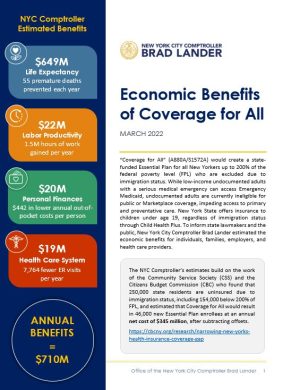Introduction
“Coverage for All” (A880A/S1572A) would create a state-funded Essential Plan for all New Yorkers up to 200% of the federal poverty level (FPL) who are excluded due to immigration status. While low-income undocumented adults with a serious medical emergency can access Emergency Medicaid, undocumented adults are currently ineligible for public or Marketplace coverage, impeding access to primary and preventative care. New York State offers insurance to children under age 19, regardless of immigration status through Child Health Plus. To inform state lawmakers and the public, New York City Comptroller Brad Lander estimated the economic benefits for individuals, families, employers, and health care providers.
NYC Comptroller Estimated Benefits

$649M
Life Expectancy
55 premature deaths prevented each year

$22M
Labor Productivity
1.5M hours of work gained per year

$20M
Personal Finances
$442 in lower annual out-of-pocket costs per person

$19M
Health Care System
7,764 fewer ER visits per year
ANNUAL BENEFITS = $710M
Sources and Assumptions
Life Expectancy
- 830 adults gaining health insurance prevents 1 death per year.
- The federal government estimates the population’s willingness to pay for reducing the risk of death, known as the Value of Statistical Life (VSL). Agencies utilize the VSL measure when conducting a benefit-cost analysis of a new policy or regulation that may affect public health, such as reducing traffic fatalities.
- Current Value of Statistical Life=$11.8 million
Sommers et. Al. (2014) Changes in Mortality After Massachusetts Health Care Reform: A Quasi-Experimental Study, Annals of Internal Medicine, 160(9), 585-593. https://pubmed.ncbi.nlm.nih.gov/24798521/
U.S. Department of Transportation, “Guidance on Valuation of a Statistical Life in Economic Analysis” https://www.transportation.gov/office-policy/transportation-policy/revised-departmental-guidance-on-valuation-of-a-statistical-life-in-economic-analysis
U.S. Environmental Protection Agency, “Mortality Risk Valuation”
https://www.epa.gov/environmental-economics/mortality-risk-valuation#meanscost
Labor Productivity
- Workers with health insurance miss 76.54% fewer workdays (1.7 vs 7.25 days per year).
- Employment rate is assumed to be 72%.
- Wage rate is assumed to be $15 per hour (minimum wage).
Dizioli, A. and Pinheiro, R., (2016) Health Insurance as a Productive Factor. Labour Economics, 40, 1-24.
http://dx.doi.org/10.1016/j.labeco.2016.03.002
Borjas, George J., (2013) Labor Supply of Undocumented Immigrants. https://www.nber.org/system/files/working_papers/w22102/w22102.pdf
Personal Finances
- Medicaid expansion reduced out-of-pocket costs by $344 in 2018 (expected to be $442 in 2023) for people between 100-138 percent of poverty.
Blavin et al (2018), Medicaid Versus Marketplace Coverage for Near-Poor Adults: Effects on Out-Of-Pocket Spending and Coverage, Health Affairs, 37(2)122-129. https://www.healthaffairs.org/doi/full/10.1377/hlthaff.2017.1166
Centers for Medicare and Medicaid Services, “National Health Expenditure Projections 2019-28” (March 24, 2020). https://www.cms.gov/files/document/national-health-expenditure-projections-2019-28.pdf
Health Care System
- Insured New York State adults (age 19-64) had 0.46 emergency department visits per person in 2019, compared to 0.63 among uninsured.
